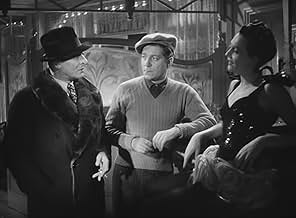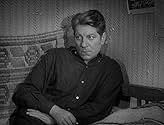IMDb-BEWERTUNG
7,7/10
8668
IHRE BEWERTUNG
Füge eine Handlung in deiner Sprache hinzuAfter committing a murder, a man locks himself in his apartment and recollects the events that led him to the killing.After committing a murder, a man locks himself in his apartment and recollects the events that led him to the killing.After committing a murder, a man locks himself in his apartment and recollects the events that led him to the killing.
- Regie
- Drehbuch
- Hauptbesetzung
- Auszeichnungen
- 1 Nominierung insgesamt
René Génin
- Le concierge
- (as Genin)
Arthur Devère
- Mr. Gerbois
- (as Arthur Devere)
René Bergeron
- Le patron du café
- (as Bergeron)
Marcel Pérès
- Paulo
- (as Peres)
Annie Cariel
- Une locataire
- (Nicht genannt)
Georges Douking
- L'aveugle
- (Nicht genannt)
Georges Gosset
- Un agent
- (Nicht genannt)
Empfohlene Bewertungen
sentimental, far to be great, almost common. but seductive under the science of Carne to give delicate nuances to flash backs, to transform scenes in little gems. and, in same measure, the art of Prevert to transform each detail in a precise piece of puzzle. a film about love and innocence. about a kind of Mephisto - remarkable performance of Berry - and delicate lights of role in Jacqueline Laurent performance. but, in many aspects, a film of Arletty and Jean Gabin. not a surprise. the names of director and scriptwriter are basic guarantees for a remarkable work. but, after so many years, like many other films," Le jour se leve" has more seductive sparkles and great profound value.
Told in flashbacks, the story slowly enfolds to explain the death that started the movie. A very touching love story. The guy is just trying to find a little love in his daily struggle to work a dead end job and make ends meet. There is miscommunication between some couples. Characters are unsure about what it is they really want out of life. Events lead tragically to a death. Trapped in his room by the police, the crowd responds with varying degrees of sympathy and confusion. Was the death inevitable? Those are the questions. In the end, you understand how the situation could have ended differently. You will enjoy this movie.
That was one of the last French masterpieces of the thirties just before the war.Marcel Carné was accused of pessimism and the movie was quickly forbidden by the military censorship that used to say in 1940:"if we've lost the war,blame it on "Quai des Brumes""(Carné's precedent movie.The director answered:"you do not blame a barometer for the storm"). "Le jour se lève " is,if it's possible,darker than its predecessor. From the very beginning,the hero,a good guy (Gabin) is doomed,his fate is already sealed,because the tragedy has already happened .That's why the movie is a long flashback.The memories are brought back on the screen with an astounding virtuosity by some elements of the set (the teddy bear for instance).Only three main characters outside that of Gabin,the evil one (Berry who was to play the devil in "les visiteurs du soir "1942),the lucid one (Arletty) and the ambiguous one (Jacqueline Laurent).The latter provides
the only flaw of the movie:Laurent acts Françoise as the innocent pure girl,however Carné leaves no doubt about her relations with Berry. A remake was made by Anatole Litvak with Henry Fonda ,Barbara Bel Geddes and Ann Dvorak (who must have been studying Arletty's acting for a long while),called "the long night" with an absurd happy end. Needless to say,it's the French Carné movie that you've got to see!
the only flaw of the movie:Laurent acts Françoise as the innocent pure girl,however Carné leaves no doubt about her relations with Berry. A remake was made by Anatole Litvak with Henry Fonda ,Barbara Bel Geddes and Ann Dvorak (who must have been studying Arletty's acting for a long while),called "the long night" with an absurd happy end. Needless to say,it's the French Carné movie that you've got to see!
A fantastic film, which plays with the emotions of the spectator while stunningly portraying the feelings of a pent-up man whose end echoes his pent-up life in the city. The film is beautifully shot in black and white and is a perfect example of French realism, with a modernist time disorientation tossed in for good measure. I found the performances by Jean Gabin and a showgirl with whom he gets involved (played by Arletty)to be strong, portrayed with a kind of hopeless, clutching pathos. Worth it simply for the beautifully constructed final shot.
French cinema at its best. Ideas of freedom, entrapment, isolation and realism wound into a great film which is carried by Gabin from the opening scene of the murder, through flashbacks he has remembered to the amazingly brutal final shot. Gabin and Laurent in the factory near the beginning of the movie is poetic realism at its most involving.
Wusstest du schon
- WissenswertesWhile not the first film to use dissolves to represent flashbacks, it was considered too new a method in the language of cinema that its producers' insisted on pre-title cards to avoid any confusion.
- Zitate
M. Valentin: You're the type women fall in love with . . . I'm the type that interests them.
- VerbindungenFeatured in Un compositeur pour le cinéma: Maurice Jaubert (1985)
Top-Auswahl
Melde dich zum Bewerten an und greife auf die Watchlist für personalisierte Empfehlungen zu.
- How long is Daybreak?Powered by Alexa
Details
Box Office
- Bruttoertrag in den USA und Kanada
- 35.321 $
- Eröffnungswochenende in den USA und in Kanada
- 11.864 $
- 16. Nov. 2014
- Weltweiter Bruttoertrag
- 35.321 $
- Laufzeit1 Stunde 26 Minuten
- Farbe
- Seitenverhältnis
- 1.37 : 1
Zu dieser Seite beitragen
Bearbeitung vorschlagen oder fehlenden Inhalt hinzufügen

Oberste Lücke
By what name was Der Tag bricht an (1939) officially released in India in English?
Antwort

















